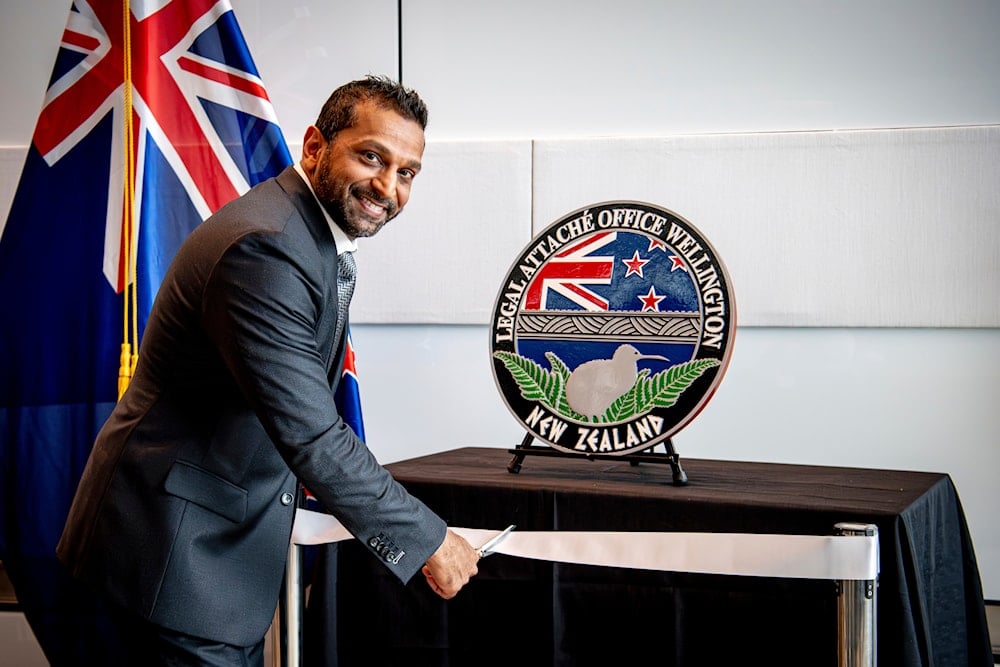FBI opens first office in New Zealand, sparking backlash in China
The opening of a new FBI office in New Zealand draws criticism from Beijing, as US-China tensions escalate in the South Pacific.
-

In this photo released by the US Embassy in Wellington, New Zealand, FBI Director Kash Patel cuts the ribbon at the official opening of the FBI office in Wellington, New Zealand, on July 31, 2025. (Ola Thorsen/US Embassy via AP)
FBI Director Kash Patel inaugurated a new standalone FBI office in Wellington on Thursday, marking the agency’s first direct presence in New Zealand. The move aligns the country more closely with other members of the Five Eyes intelligence alliance, comprising the US, UK, Canada, Australia, and New Zealand.
Patel said the Wellington office aims to counter the "influence of the Chinese Communist Party" in the South Pacific Ocean, drawing a swift response from both Beijing and New Zealand officials.
In a video released by the US embassy, Patel emphasized that the new mission will support efforts to address challenges posed by China’s growing regional footprint. FBI activities in New Zealand had been overseen from Australia since 2017.
New Zealand officials dismiss focus on China
Despite Patel’s remarks, New Zealand ministers who met with him quietly pushed back on his narrative, emphasizing joint efforts on non-political transnational issues.
In a government statement released on Thursday, they highlighted cooperation on crimes such as online child exploitation and drug trafficking, with no mention of China. Foreign Minister Winston said, "When we were talking, we never raised that issue," referring to China.
Minister for the Security Services Judith Collins underscored the focus on law enforcement, telling reporters, "I don’t respond to other people’s press releases," when asked about Patel’s China-related comments.
Trade Minister Todd McClay also rejected the notion that the office opening was celebrated. "Well, I don’t think it was celebrated yesterday. I think there was an announcement and it was discussed," he said.
Beijing condemns US remarks
Beijing responded strongly to Patel’s statements. During a briefing on Friday, Chinese Foreign Ministry spokesperson Guo Jiakun condemned the remarks, warning against alliances aimed at containing China.
"China believes that cooperation between countries should not target any third party," Guo said, adding, "Seeking so-called absolute security through forming small groupings under the banner of countering China does not help keep the Asia Pacific and the world at large peaceful and stable."
China is shocked by the remark of FBI Director that the new FBI office in New Zealand is “a way to counter China’s influence” in the region.
— CHINA MFA Spokesperson 中国外交部发言人 (@MFA_China) August 1, 2025
Cooperation should not target any third party. Seeking “absolute security” for a few in the name of “countering China” will not make the… pic.twitter.com/G7b7QRq18E
As the smallest partner in the Five Eyes alliance, New Zealand has long sought to maintain a delicate balance between its security partnerships and trade with China, its largest trading partner.
The announcement sparked backlash among New Zealanders, with social media flooded by thousands of negative comments about the FBI’s expanded presence. Public unease translated into action, with a protest against the office planned over the weekend.
Jason Young, associate professor of international relations at Victoria University of Wellington, said the opposition likely stems from broader discomfort with US political moves. "I think it would be more a reflection of some of the deep unease that many people in New Zealand see with some of the political choices that are being made in America at the moment," Young said.
US officials escalate rhetoric on China
It is worth noting that Patel’s visit coincided with the US' offensive posturing against China, especially in the Indo-Pacific.
Speaking in June, US Defense Secretary Pete Hegseth described China as an "imminent threat" and urged regional nations to raise their military spending to 5% of GDP.
New Zealand has historically refrained from naming specific countries in discussions of regional security, but analysts say the US is likely pushing Wellington to align more directly with its strategic positioning on China.
“It’s in New Zealand’s interest to have more law enforcement activities to deal with our shared problems,” said Young. “It’s perhaps not in New Zealand’s interest to say we’re doing this to compete with China.”
New Zealand, home to just 5 million people, was once viewed as peripheral in global strategic calculations. But its geographic position and increasing influence in the South Pacific, where Beijing has actively courted smaller island nations, have elevated its importance to countries like the US.

 4 Min Read
4 Min Read










